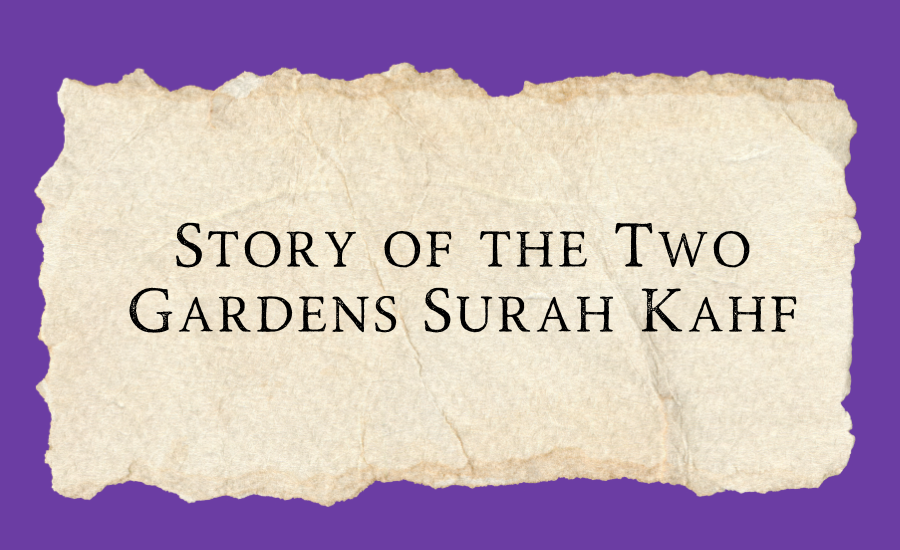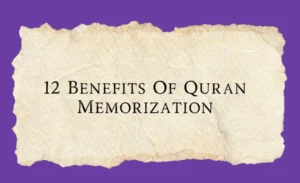The Parable of the Two Gardens, found in Surah Al-Kahf (18:32-44), is a profound story that explores the nature of wealth, human arrogance, and the fleeting nature of worldly life. It tells the tale of two men: one blessed with lush gardens, abundant harvests, and material prosperity, who became prideful and boastful, forgetting that all blessings come from Allah; the other, humble and mindful of Allah, who reminded his wealthy companion that true success lies not in riches but in gratitude, righteousness, and faith.
This parable serves as a timeless warning that wealth and status are temporary, while spiritual awareness and reliance on Allah are eternal. It teaches that material abundance can lead to arrogance and negligence of God, whereas humility, patience, and thankfulness bring lasting peace and divine reward. Reflecting on this story encourages Muslims to evaluate their priorities, cultivate gratitude, and remain mindful of the ultimate reality beyond worldly gains, making it as relevant today as it was centuries ago.
Quranic Account of the Two Gardens
The Quran narrates the story as follows:
Arabic:
وَاضْرِبْ لَهُم مَّثَلًا رَّجُلَيْنِ جَعَلْنَا لِأَحَدِهِمَا جَنَّتَيْنِ مِنْ أَعْنَابٍ وَحَفَفْنَاهُمَا بِنَخِيلٍ وَجَعَلْنَا فِيهِمَا كُلَّ شَيْءٍ مَّقْدُورٍ
Transliteration: Wadrib lahum mathalan rajulaini ja’alna li-ahadihima jannataini min a’nabin wa hafafnahuma binakhilin wa ja’alna fihi kull shay’in maqdoor
English Translation: “And present to them the example of two men: We granted to one of them two gardens of grapevines, surrounded by date palms, and We placed crops in them of every kind.” (Surah Al-Kahf 18:32)
The Quran introduces the Parable of the Two Gardens in Surah Al-Kahf (18:32), describing one man blessed with abundant gardens, date palms, and diverse crops. This verse sets the stage for a powerful lesson on wealth, humility, and reliance on Allah, highlighting how material blessings can test a person’s character and faith.
The Story in Detail
The Parable of the Two Gardens narrates the contrasting lives of two men and the lessons that emerge from their choices. One man was blessed with two magnificent gardens, overflowing with grapevines, date palms, and a variety of crops, producing abundant harvests. His wealth and prosperity led him to become arrogant and boastful, claiming that his gardens and possessions would last forever. He forgot the source of his blessings i.e. Allah and looked down on his humble companion, failing to acknowledge that material wealth is a temporary trust rather than a permanent guarantee.
In contrast, the other man remained humble, grateful, and conscious of Allah. He reminded his wealthy friend that all blessings come from Allah, and that wealth alone does not guarantee true success or protection from trials. He emphasized that gratitude, humility, and reliance on Allah are the foundation of lasting contentment and spiritual reward.
Suddenly, Allah caused the boastful man’s gardens to withstand calamity and destruction, leaving him astonished and regretful. The lush gardens he once prized became a reminder that worldly abundance is fleeting, and reliance on wealth alone can lead to ruin. Meanwhile, the humble man’s example demonstrates that faith and righteousness endure, and those who remain grateful and obedient to Allah will always find true success.
Through this parable, Allah teaches that material blessings are a test, and the measure of a person’s character is not their wealth, but their humility, gratitude, and consciousness of God. The story encourages believers to reflect on their own lives, maintain spiritual awareness, and use their resources responsibly, always prioritizing faith over worldly gain.
Key Lessons from the Parable of the Two Gardens
Below are some key lessons from this story:
Wealth is a Trust, Not a Guarantee
Material possessions are temporary blessings from Allah. Believers must remain humble and grateful, recognizing that wealth can vanish at any time.
Pride Leads to Downfall
The story warns against arrogance and self-reliance. Ignoring Allah and boasting about worldly success can lead to sudden loss and humiliation.
Gratitude and Humility Are Eternal
True happiness comes from being grateful for what Allah provides and using it responsibly. The humble man’s example demonstrates that spiritual wealth surpasses material wealth.
Faith over Worldly Success
Success in this world is fleeting, but righteousness and faith endure. Believers are reminded to prioritize their relationship with Allah over accumulating worldly riches.
Additional Reflections
This story has additional lessons that include:
- The parable illustrates that everything in this world is temporary, and reliance on Allah is essential.
- Scholars often connect this story with the recitation of Surah Al-Kahf on Fridays, as reflecting on these parables illuminates the heart and strengthens reliance on Allah.
- The destruction of the wealthy man’s gardens is a symbolic warning: worldly success without gratitude and humility can disappear suddenly, no matter how secure it seems.
Quranic Reminder of Gratitude and Reliance
Allah says in Quran:
Arabic:
وَلَا تَمُدَّنَّ عَيْنَيْكَ إِلَىٰ مَا مَتَّعْنَا بِهِ أَزْوَاجًا مِّنْهُمْ زَهْرَةَ الْحَيَاةِ الدُّنْيَا لِنَفْتِنَهُمْ فِيهِ وَرِزْقَ رَبِّكَ خَيْرٌ وَأَبْقَى
Transliteration: Wa la tamuddanna ‘aynayka ila ma matta’na bihi azwajan minhum zahrat al-hayat ad-dunya linaftinahum feehi wa rizq rabbika khayrun wa abqa
English Translation: “And do not extend your eyes toward that by which We have given enjoyment to some groups of them, the splendor of the worldly life, in order to test them; but the provision of your Lord is better and more enduring.” (Surah Al-Kahf 18:46)
This verse reminds believers that worldly wealth and splendor are temporary and serve as a test from Allah. True and lasting provision comes from Him, emphasizing the importance of gratitude, humility, and reliance on Allah over attachment to material possessions.
Modern Lessons for Muslims Today
Below are some important lessons for Muslims today:
- Avoid materialism and arrogance in a world driven by wealth and status.
- Practice gratitude, charity, and humility with what Allah provides.
- Reflect on your relationship with Allah rather than obsessing over worldly possessions.
- Understand that loss of wealth is not punishment but a reminder to stay humble and reliant on Allah.
Gratitude and Reliance on Allah: Keys to True Success
The Parable of the Two Gardens offers a timeless reminder that material wealth is fleeting, and true success lies in faith, gratitude, and reliance on Allah. While the arrogant man clung to his worldly possessions, the humble man’s humility and mindfulness of Allah ensured lasting spiritual reward. For believers today, this story encourages reflection on priorities, responsible use of blessings, and avoidance of pride or arrogance. By placing faith above fortune, Muslims can navigate life with wisdom, contentment, and a focus on the eternal, ensuring that both worldly life and the hereafter are approached with balance and righteousness.
FAQs about the Parable of the Two Gardens
What is the main lesson of the Parable of the Two Gardens?
The parable teaches that wealth is temporary, humility and gratitude are essential, and true success lies in faith in Allah.
How does this story relate to Surah Al-Kahf?
It is one of the key narratives in Surah Al-Kahf, illustrating the dangers of arrogance and attachment to worldly possessions, and highlighting reliance on Allah.
Can this story be applied in modern life?
Yes. It encourages believers to avoid materialism, be grateful, and prioritize spiritual growth over worldly wealth.
What does Allah say about worldly wealth in this parable?
Allah reminds that worldly wealth is temporary, and the true and lasting provision comes from Him. (Surah Al-Kahf 18:46)






